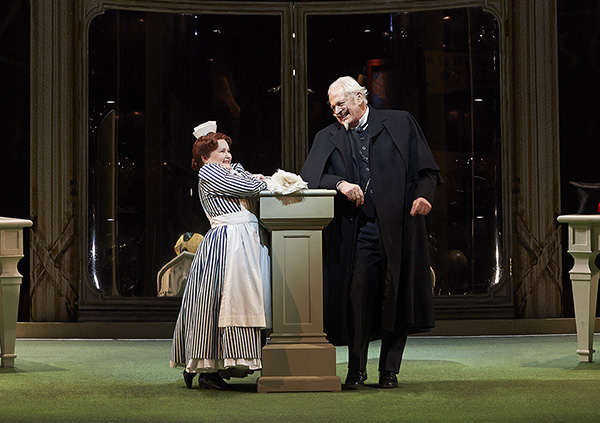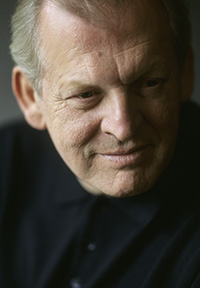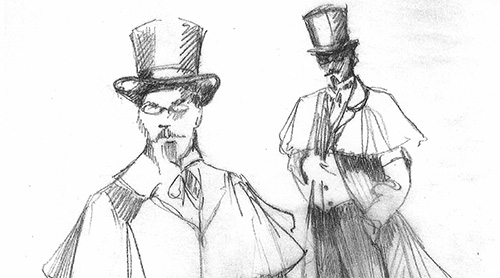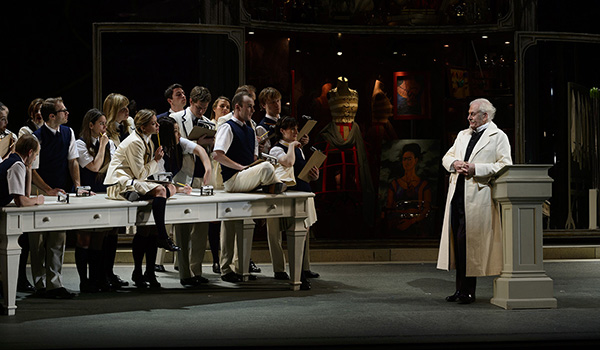-
A Musical Lifetime with Così: Sir Thomas Allen
By Danielle D'OrnellasPosted in Cosi fan tutteBy Gianmarco Segato, Adult Programs Manager

In an age in which superlatives such as “unforgettable,” “legendary” and “greatest” are thrown about indiscriminately, few would argue Sir Thomas Allen’s status as the pre-eminent lyric baritone of his generation. He has earned this title most especially for his iconic interpretations of Mozart’s Don Giovanni, Count Almaviva, Figaro, Papageno, Guglielmo and Don Alfonso, both onstage and in the recording studio. Following his appearances at the Glyndebourne Festival in Sir Peter Hall’s legendary production, EMI recorded his Don Giovanni in 1984 – now considered the definitive account of Mozart’s notorious womanizer. For close to four decades he has been the baritone of choice for star conductors such as James Levine, Riccardo Muti, Georg Solti, John Eliot Gardiner, Colin Davis and Simon Rattle. Allen has not only mastered the fine balance between singing and acting needed to be a great opera singer, but stands as a master interpreter of the art song, especially in the English and French repertoire. He now passes on his expertise to the next generation of artists, giving masterclasses worldwide including, since 1996, at his own Samling Academy, located in Allen’s beloved native country in North East England.
 Sir Thomas Allen’s association with Mozart’s Così fan tutte goes as far back as his student days in the 1960s when he came to the attention of the great British vocal pedagogue, James Lockhart. “One of the things I worked on with him was how to go through a score. He taught me how to do that and read it as a singer, prepare and pencil it up and do the things that all singers do. And the score chosen was Così, though I didn’t learn the role [Guglielmo] at the time, maybe just one of the arias perhaps. After that he [Lockhart] became music director at Welsh National Opera and one of the first things I did with them was a touring version of Così. That goes back to 1970 or something like that.” Allen’s first Così role, Guglielmo, is often regarded as a rite of passage for the budding lyric baritone. “I think the reason why we as a breed feel that way is that it doesn’t seem to have the emotional maturity of a role like that of Ferrando [with whom Guglielmo schemes to prove the infidelity of their respective fiancées]. The relationship Guglielmo enjoys with Dorabella is one of pure pleasure rather than the [more emotionally deep] way Ferrando latches onto Fiordiligi. Musically as well, of all the Così roles, Guglielmo is the one that tends most towards the buffo [comic].” The other three young leads sing some of the most sublime, grand and emotional music Mozart ever wrote but Guglielmo’s “vocal opportunities are just not on the same level.”
Sir Thomas Allen’s association with Mozart’s Così fan tutte goes as far back as his student days in the 1960s when he came to the attention of the great British vocal pedagogue, James Lockhart. “One of the things I worked on with him was how to go through a score. He taught me how to do that and read it as a singer, prepare and pencil it up and do the things that all singers do. And the score chosen was Così, though I didn’t learn the role [Guglielmo] at the time, maybe just one of the arias perhaps. After that he [Lockhart] became music director at Welsh National Opera and one of the first things I did with them was a touring version of Così. That goes back to 1970 or something like that.” Allen’s first Così role, Guglielmo, is often regarded as a rite of passage for the budding lyric baritone. “I think the reason why we as a breed feel that way is that it doesn’t seem to have the emotional maturity of a role like that of Ferrando [with whom Guglielmo schemes to prove the infidelity of their respective fiancées]. The relationship Guglielmo enjoys with Dorabella is one of pure pleasure rather than the [more emotionally deep] way Ferrando latches onto Fiordiligi. Musically as well, of all the Così roles, Guglielmo is the one that tends most towards the buffo [comic].” The other three young leads sing some of the most sublime, grand and emotional music Mozart ever wrote but Guglielmo’s “vocal opportunities are just not on the same level.”
On the other hand, Allen relishes the entirely different demands made of Don Alfonso, Così’s philosopher and cynic, and the role which brings him to the COC this winter. He draws some fascinating parallels between Alfonso and Don Giovanni, the Mozart role with which he has the closest association. “It’s a strange thing about Mozart. If one looks at Don Giovanni musically, he isn’t all that demanding – it’s an endurance test and you have to sing very loudly at the end of the piece. But you’ve not been asked great musical questions during the course of it in the way Donna Anna has, or had to sing the long-breath lines that Don Ottavio has. And similarly, Don Alfonso doesn’t have those great [vocal] demands made of him. The thing is to use those moments when you’ve seemingly not been asked to do much… when in fact you are actually doing a lot. Then it’s a question of listening to what others are doing, and causing action and reaction in them by just being there; by setting a plan in motion, sowing a seed of doubt or whatever it might be. A lot of it is just sitting down, crossing your legs comfortably, having a cup of coffee whilst you’re watching everything going on. That’s the way it often pans out. I have no qualms about that – I don’t crave great lengthy stentorian arias – I’m very happy to just pull the strings and watch the others dance to my tune!”
Having mastered Così’s two low-voiced male roles, Allen has taken the next logical step and can now be found directing Mozart’s effervescent comedy in addition to Don Giovanni, The Marriage of Figaro and The Magic Flute for companies such as Scottish Opera, Arizona Opera and Boston Lyric Opera. For the latter he not only directed Così but simultaneously played Don Alfonso, an undertaking which required “eyes in the back of your head. It’s not easy, but not impossible either.” In Boston he opted to perform the opera in English, wanting the text to have an immediate impact on the audience. For Allen, communication through music – its actual sounds, pitches and dynamics – are definitely the singer’s responsibility, but even more important is the performer’s ability to personally connect to the text and enliven it for the audience. By using an English translation for his Boston Così, he wished the singers to experience the words first, rather than second-hand. “Using one’s own language is a distinct advantage. I don’t care how seriously and intensely you work with a second or third language – there’s nothing like getting back to one’s own – it’s in your DNA. Also, the colours that become available to a singer for expression are that much more telling. It’s a much more advanced process when you’re learning a role that’s not your native language.” That, says Allen, is “a lifetime study. I’m still doing it.”

Just as director Atom Egoyan will re-envision Mozart’s “school for lovers” for our audiences, Allen will also be looking at it afresh. “The main thing is not to come with anything assumed. Listen to what [the director] gives you and then respond to that rather than relying on the process you’ve used for years and years. I keep on saying this to singers – listen to what you’re hearing and respond to that, not to the thing you’ve learned like a parrot from several recordings.” Having lived with Così for over 40 years, Allen has witnessed a huge sea change in attitude with respect to the piece. There might have been a time when critical opinion denigrated the opera for its perceived immorality and frivolity, but in a post-Freudian world fascinating avenues have opened up to explore the “lessons of love” which lie beneath its undeniably frothy exterior. As Allen reasons, “It’s no longer possible to regard these characters simplistically, as no more than decorative 18th-century porcelain figurines.” This is especially true of the opera’s ambiguous ending – do the original couples “kiss and make up,” returning to their original partners, or are their relationships damaged forever? Allen feels the answer is found in Mozart’s score itself: “You start thinking surely [the two couples] can’t just return to everyday life as a result of the lessons that have been learned. In a way, Mozart indicates this in the finale which is in the very basic key of C major. It’s music that’s so simplistic, almost as though he’s deliberately trying to show us that [the wedding between the two “original” couples] is a façade – they’re clearly going through the motions here – it’s very superficial when you think of all the glorious music that went before.” How will things end up for the lovers in Toronto this winter? Allen and his fellow cast members will no doubt have fun playing with the possibilities when they meet on stage for the COC’s new production of Così.
Photos: (top) Tracy Dahl as Despina and Sir Thomas Allen as Don Alfonso in the Canadian Opera Company's new production of Così fan tutte, 2014. Photo: Michael Cooper; (middle) Sir Thomas Allen. Photo by Sussie Ahlburg; (middle) Preliminary costume sketches for Don Alfonso for the COC's new production of Così fan tutte, by set and costume designer Debra Hanson; (bottom) Sir Thomas Allen as Don Alfonso (at right) with the COC Chorus in a scene from the Canadian Opera Company’s new production of Così fan tutte, 2014. Photo by Chris Hutcheson.
